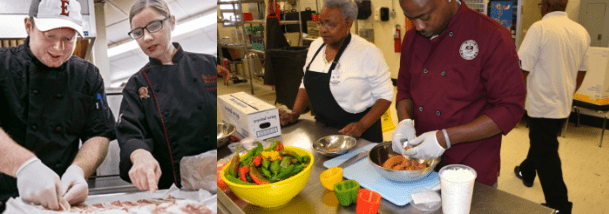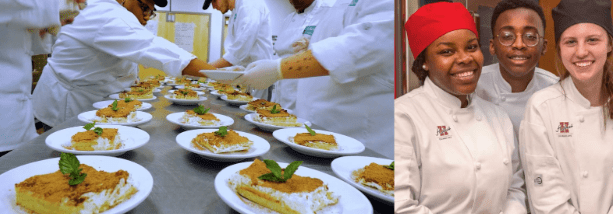
(Photo from Mississippi Delta Community Culinary Arts Program)
- With hospitality industry booming, demand for food service programs at community colleges growing.
Across the state, college students are learning how to turn their passion for food into careers.
Community colleges such as Meridian, East Mississippi, Mississippi Gulf Coast, Mississippi Delta, Holmes, Hinds, Northeast, Coahoma, and others provide hands-on culinary training grounded in classical, American, and international cuisine, with specialized classes in baking and pastry arts. It’s become the recipe for workforce revitalization.
The Proof is in the Pudding
The state’s hospitality industry is booming. The Mississippi Department of Employment Security projects a 21.5% increase in demand for food service managers between 2020 and 2030. The demand for chefs and head cooks is also rising. These community college culinary programs help meet that demand and equip graduates for those roles.
To prepare students for real-world employment in a competitive, growing food industry, students train in commercial kitchens, earn industry-recognized certifications such as the ServSafe Sanitation credential, and often participate in externships or partnerships with local restaurants and hospitality groups.
According to a 2025 study on Mississippi community colleges, career-technical certificate graduates earn significantly more in their first year of employment than their high school graduate peers. That’s especially true for culinary students who enter the workforce with practical experience and highly valued certifications.
Since the culinary industry has become a respected and strategic career move, bolstered by demand and statewide initiatives, many graduates choose to stay in Mississippi. This high retention rate among community college alums means that these programs are crucial in building a stable, skilled in-state workforce, particularly in rural and underserved areas.

Serving Creative Economies
The culinary arts play a critical role in Mississippi’s growing creative economy. Food is essential to the state’s cultural and economic identity. Community college graduates are staffing restaurants and elevating Mississippi’s food scene with fresh perspectives, diverse backgrounds, and innovative techniques.
The culinary arts also intersect with many other creative sectors, from marketing to media. Yes, students find employment in restaurant kitchens. But they also build careers in food journalism, photography, entrepreneurship, and culinary education.
Tourism benefits, too. A thriving food scene is a significant draw for visitors, and Mississippi’s network of culinary professionals is redefining the state’s appeal as a food destination. Food festivals and farm-to-table initiatives highlight how the culinary arts encourage exploration and investment in Mississippi.

Accessible, Attainable, and Affordable
Community colleges offer lower tuition rates than private or four-year institutions and provide flexible scheduling, smaller class sizes, and personalized instruction.
Take Holmes Community College, for example. Its two-year Culinary Arts Technology program blends theory with practice through lab instruction, industry tours, and externships. Students leave with certifications, job-ready skills, and professional connections at a fraction of the cost of a culinary institute.
East Mississippi Community College and Meridian Community College train students in classical and international cooking techniques, advanced business skills, and nutritional science. Similarly, at Northeast Mississippi Community College, students can earn foundational skills and certifications in nutrition, customer service, and hospitality management.
Community colleges create continuing education pathways by forming partnerships with four-year universities. For instance, East Central Community College offers transfer agreements with Mississippi State University for students pursuing a degree in the culinology discipline, combining food science and culinary arts. The W’s unique model allows students to begin their culinary training at Mississippi Gulf Coast Community College, then complete a bachelor’s in culinary management or even an MBA. So, the tastiest portion is—students never leave the state.

Cultivating a Culinary Cohort
The growth of culinary arts in Mississippi results from partnerships between community colleges, four-year universities, local businesses, and nonprofit organizations. The Hinds Community College culinary arts program benefits from support from national chains like Chick-fil-A and Ruth’s Chris Steakhouse, and beloved Mississippi brands like Mangia Bene Inc. Restaurant Mgmt. Group (BRAVO!, Broad Street, Sal & Mookie’s, SoulCity Hospitality). These industry partners provide scholarships, mentorships, internships, and jobs.
Initiatives like Mississippi State University Extension’s culinary camps introduce young people to the culinary world to foster interest long before college. By framing cooking as both an art and a science—and a potential career—these programs help shift public perception by emphasizing cooking techniques, leadership, problem-solving, and entrepreneurship, skills essential in any modern workplace. No longer are culinary jobs viewed as low-wage or low-skill but as a prosperous future in creativity, business opportunities, and professional pride.
So, as Mississippi continues to seek innovative ways to grow, retain its homegrown talent, and boost its economy, its community colleges offer a flavorful solution with a delicious future.











